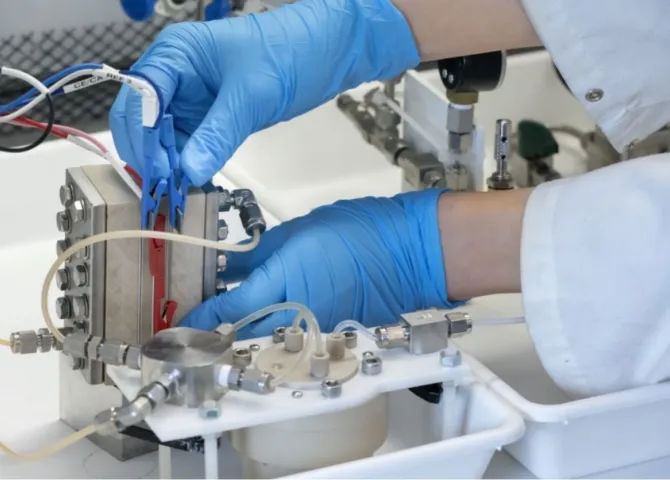Breadcrumb
- Home
- Melbourne Stories
- Carbon neutral fertiliser to feed the world: Jupiter Ionics
Carbon neutral fertiliser to feed the world: Jupiter Ionics
Jupiter Ionics, a Melbourne start-up evolved from Monash University research, has developed a technology to make green ammonia – the main ingredient in fertiliser – that has the potential to revolutionise global food production and the broader energy transition.

Why Melbourne?
“Silicon Valley works well as an innovation ecosystem because is it a high trust environment. Our relationship with Monash University reflects this and we continue to create other connections with equivalent levels of trust. Climate tech in Melbourne is aiming towards this point – the richer our network, the stronger the trust and the faster we can all develop.”
- Jupiter Ionics CEO, Charlie Day
Challenge
Ammonia is the main ingredient in fertiliser, without which almost half the world’s population would starve. About 200 million tonnes of ammonia are produced annually, mostly for the AUS$70 billion fertiliser market as a source of nitrogen, a vital plant nutrient.
As the global population increases, so does our need for fertiliser and, therefore, ammonia. Unfortunately, making ammonia using current technology is extremely unsustainable. It requires hydrocarbons (fossil fuels) and an immense amount of heat, also created by burning fossil fuels.
Producing a single tonne of ammonia by conventional methods generates two tonnes of carbon dioxide. To put this in perspective, the chemical reaction required uses about one percent of the world’s energy and emits nearly two percent of the world’s carbon dioxide – about the same emissions as the entire global airline industry.
Producing carbon-neutral, green ammonia is key to enabling ammonia-fuelled transport and the export of renewable energy.
Solution
The push is on to decarbonise fertiliser manufacture, starting with its main ingredient.
New electrolysis technology developed by Melbourne start-up, Jupiter Ionics (in partnership with Monash University), is at the forefront of this push.
Jupiter Ionics’ electrolytic cells make green ammonia from air and water using renewable energy sources such as solar or wind power. Once commercialised, the technology will have the potential to transform global food production and overall energy transition. ls.
Result
Jupiter Ionics’ modular technology has capacity to produce green ammonia for one farm or entire farming communities. Farmers will be able to make their own fertiliser, whether they have a smallholding in India or a thousand hectares in Australia. This secures local supply and further reduces carbon emissions by eliminating transport.
Decentralising production also reduces global supply chain risks. For example, Russia and Ukraine are both major fertiliser producers and the war has caused enormous supply chain disruptions and affected fertiliser costs around the world.
The environmental and economic potential of green ammonia extends even further. Green ammonia could be used as a clean-burning fuel to replace heavy fuel oil in international shipping and has the capacity to transform the export of renewable energy for countries like Australia.
Historic demands for fertiliser mean the global infrastructure for ammonia transport and storage already exists. Distributing ammonia is safer, easier and cheaper than hydrogen. Ammonia is almost twice as energy-dense as hydrogen, far less flammable and can be stored at a much higher temperature.
In 2023, Jupiter Ionics’ patented technology was recognised by leading international bodies like the Royal Society of Chemistry and the Nature Awards spinoff prize, and investors are now stepping up to help commercialise it.
The latest capital raise was announced in March 2024 – A$9 million from three new investors, including CIMIC Group, that will integrate the technology into larger prototypes (a self-contained system that takes in water, air and renewable energy to produce ammonia) and speed the journey to market.
“Scaling up green ammonia production with innovating technologies has never been more critical. This investment aligns with our commitment to support innovative solutions that address environmental and economic challenges and represents an important sovereign capability for Australian agriculture.”
- Monash University Chief Commercial Officer and Jupiter Ionics’ Board Member, Alastair Hick





